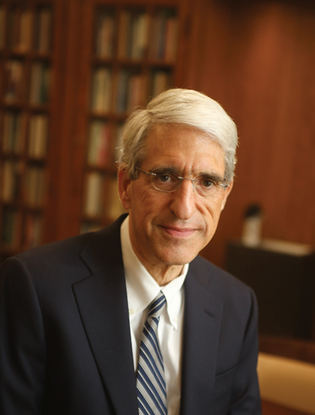
Mark Ostow
The Yale Alumni Magazine publishes a letter from President Peter Salovey ’86PhD in every issue. In this letter, the president considers the rapid growth of artificial intelligence.
View full image
Dear Friends,
The public launch of the AI chatbot ChatGPT last fall ignited excitement, concern, and a great deal of productive and necessary discourse. This online tool uses artificial intelligence to respond to users’ requests. (Anyone can go to chat.openai.com and test it out—in fact, I have.)
I am in a poetry club, so I asked ChatGPT to write a poem for me. I gave it very specific instructions: a three-stanza structure, a theme (friendship), an iambic pentameter meter, and an A-B-B-A rhyming scheme. I asked it to include metaphors using acorns. In seconds, the program wrote me a poem to those specifications. The poem was not especially good. I might give it a B-, but it was not a bad first draft. While this result speaks to the current abilities of the technology, it is becoming more proficient quite swiftly.
A few months ago, if a student wanted to cheat by having an AI tool write his paper for a class, it would probably produce a draft that—if unedited—would be fairly easy to identify as software-generated. But this has already changed. GPT-4 and other AI chatbots and technologies have emerged, and they are steadily improving.
As AI interfaces evolve and promise to transform all sectors of society and every aspect of our lives, leading global universities like Yale must balance our focus on research in the field with our responsibility to contribute knowledge that can inform the ethical and beneficial development of these technologies.
There is incredibly exciting work in AI going on across Yale, spanning fields and schools. Our strengths at the intersection of disciplines—in science, engineering, policy, law, economics, business, healthcare, and others—position us to lead in ways that other institutions cannot. Faculty members around the university are engaged in a wide array of research projects that not only advance machine learning but also expose and help correct fundamental problems.
Professor Nisheeth Vishnoi, for example, studies some of the most complex ethical questions at the interface of AI and society, such as eliminating biases in chatbots and ensuring new tools—exciting as they are—do not exploit underprivileged groups or invade privacy. Professors Arman Cohan and Leandros Tassiulas (with, until recently, the late Dragomir Radev—a loss for us all) work at the forefront of natural language processing, the branch of AI concerned with giving computers the ability to work with human language—as chatbots do. Meanwhile, Professors Brian Scassellati and Tesca Fitzgerald study how robots and humans interact, and how we can ensure that AI assistive technologies—which use computers to help humans function—are improving performance. Next academic year, Professor Luciano Floridi will join Yale as the founding director of the Digital Ethics Center. Internationally renowned for his research on the philosophy and ethics of digital technologies, including artificial intelligence, he will lead the center in bringing together multiple disciplines to study the governance, ethical, legal, and social implications of digital technologies.
Of course, AI and chatbots also present new challenges and opportunities for pedagogy and education. In response, Yale’s Poorvu Center for Teaching and Learning is running workshops to guide instructors on how to use text generation software as a learning tool, how to avert AI-enabled cheating, and how to best set student-teacher expectations in this shifting landscape.
In addition, student demand for computer science courses has increased across the US, and Yale is no exception. Enrollment in computer science courses at Yale has grown over the last five years, from 2,286 in 2017–2018 to 3,205 in 2021–2022. Computer science added seven new tenure-track faculty members last year, and we will continue allocating resources to meet rising student demand and stay at the forefront of this rapidly advancing field.
New technologies can be disorienting and disruptive. Yet our society has made major technological leaps before. AI is only beginning to show its value in enhancing and inspiring new kinds of creative work. Technology will not replace teaching and learning, nor will it diminish human ingenuity. Successfully navigating change does require care and foresight—and we have these in abundance at Yale. I, for one, am excited by the opportunities presented by these emerging tools.
With my warmest wishes,
Peter Salovey ’86PhD
President
Chris Argyris Professor of Psychology
 loading
loading